Taqabbalallahu Minna Wa Minkum in Arabic, Meaning And Response
The phrase “Taqabbalallahu minna wa minkum” is an Arabic greeting commonly exchanged by Muslims during the festival of Eid. It is a supplication that is also said in the Holy month of Ramadan.
Advertisements
In this Dua, we pray to the Creator to accept our deeds and our prayers from the person who supplicated and from all of us.
Taqabbalallahu Minna Wa Minkum In Arabic Text
The Arabic text of Taqabbal Allahu is
تَقَبَّلَ اللهُ مِنَّا وَمِنكُم
Taqabbalallahu Minna Wa Minkum Meaning in English
The meaning of taqabbalallahu minna is May Allaah accept (this worship) from us and from you.
Advertisements
Transliteration
Here are other common transliterations to help with pronunciation:
- Taqabbal allahu minna wa minkum
- Taqabbalallahu minna wa minkum
- Taqabbal-Allâhu minnâ wa minkum
- Taqaballahu Minna Wa Minkum
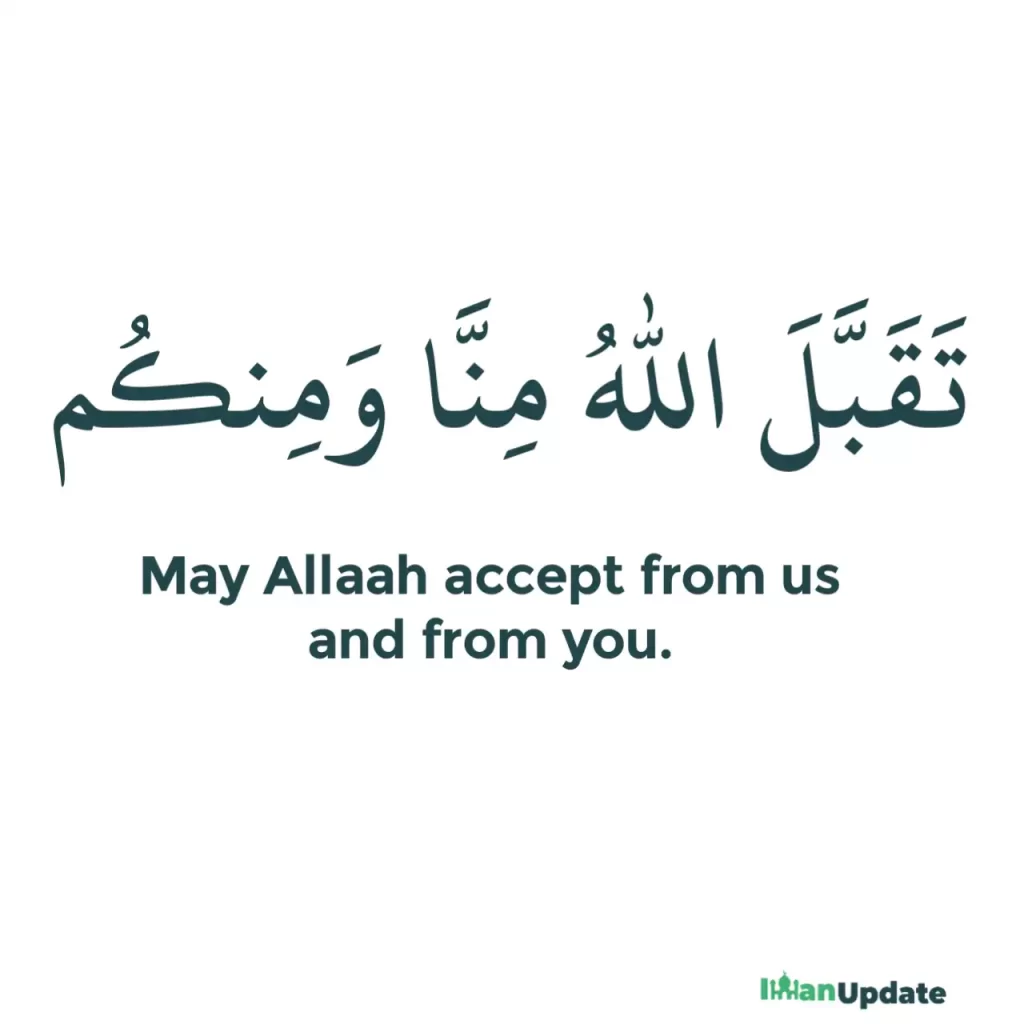
During Eid period, many people search through different search engines and on social media pages to look for the perfect response to that phrase.
The art of choosing a response entails instilling and increasing love and intimacy between people.
It is one of the phrases that are circulated after the end of the holy month of Ramadan and the advent of the blessed Eid al-Fitr.
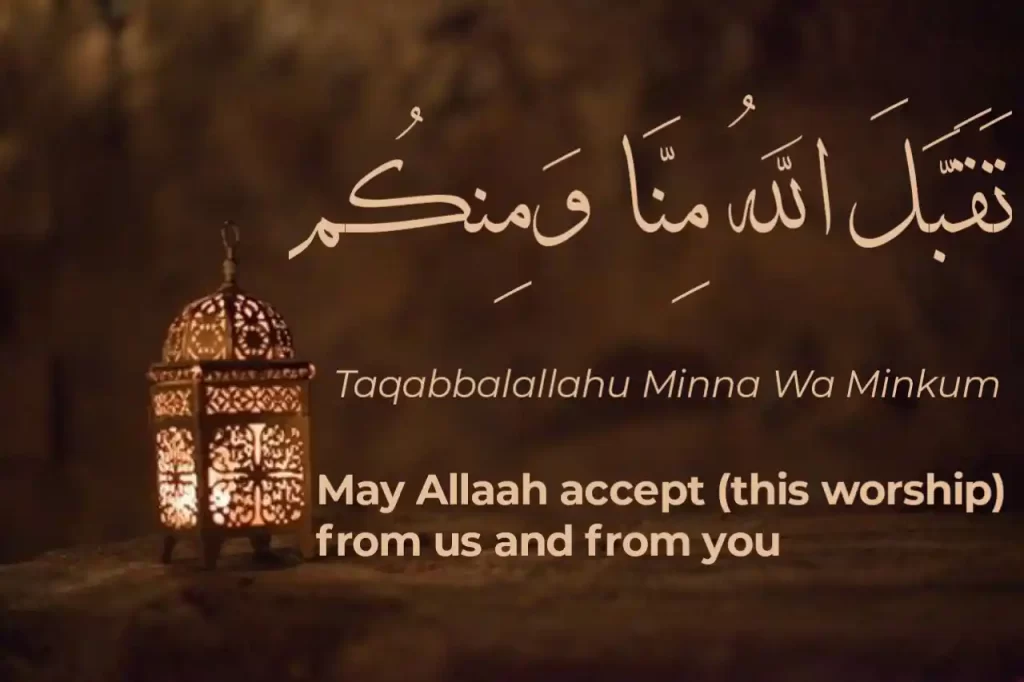
How To Reply Taqabbalallahu Minna Wa Minkum
If someone greets you with “Eid Mubarak” or any other Eid-related greeting, you can respond with “Taqabbalallahu minna wa minkum.” This is a way of reciprocating the good wishes and expressing a mutual hope that Allah accepts the efforts and deeds of both parties.
Advertisements
Here’s how you can reply:
- Person 1: “Eid Mubarak!”
- Person 2: “Taqabbalallahu minna wa minkum.”
This exchange is a polite and traditional way of acknowledging the greeting and conveying well-wishes during the festive occasion.
Also, if anyone greets you with the greeting “Taqabbal Allahu minna wa minkum” you should reply with the same greeting “Taqabbal Allahu minna wa minkum”.
Advertisements
You can also say Ameen, then greet with same phrase.
And Allah alone knows the best.
The beautiful response is represented in many forms, and the most important of which are the following:
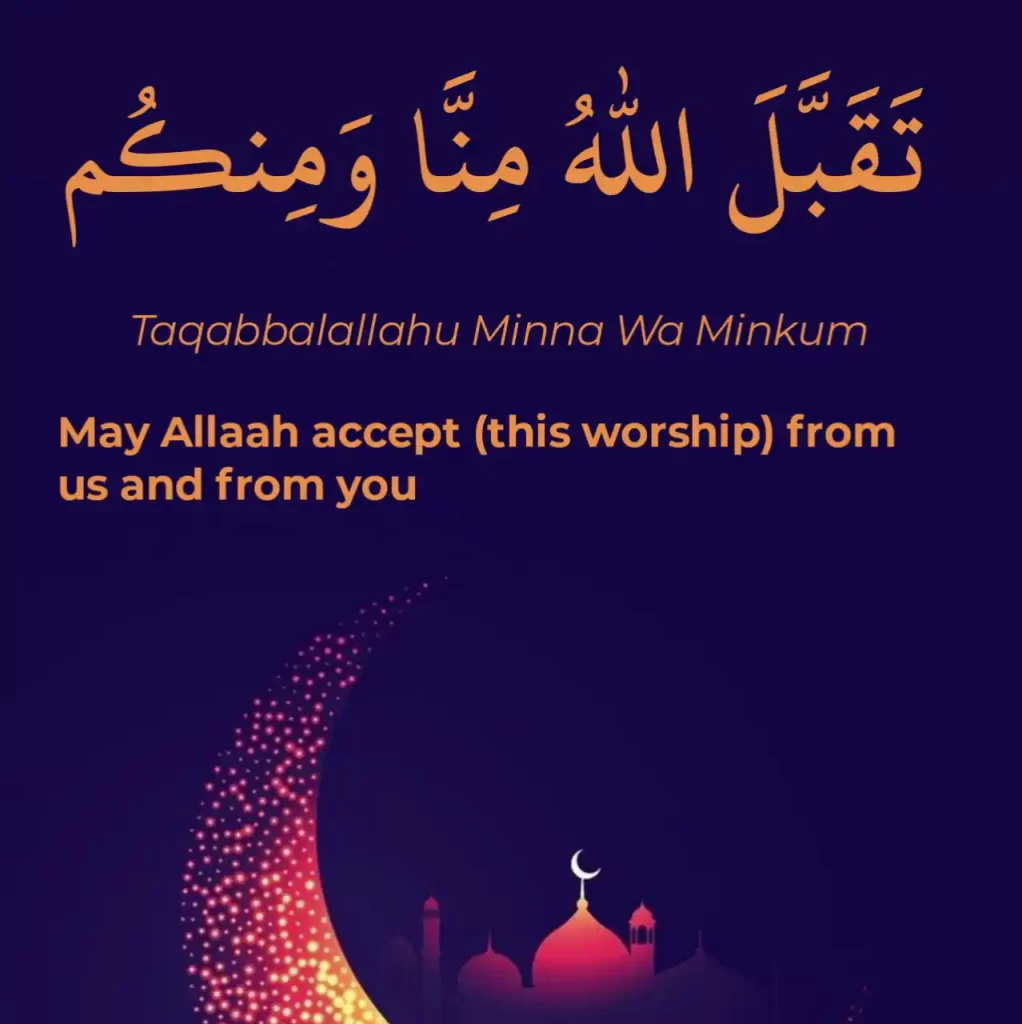
Ruling On Saying Taqabbal Allahu Minna Wa Minkum
It was narrated that that Sahaabah (may Allaah be pleased with them) used to congratulate one another on the occasion of Eid by saying Taqabbal Allaahu minna wa minkum (May Allaah accept (this worship) from us and from you).
It was narrated that Jubayr ibn Nufayr said: When the companions of the Messenger of Allaah (peace and blessings of Allaah be upon him) met one another on the day of Eid, they would say to one another: Taqabbal Allaahu minna wa mink.
Imam Ahmad (may Allaah have mercy on him) said: There is nothing wrong with one man saying to another on the day of Eid: Taqabbal Allaahu minna wa mink (May Allaah accept (this worship) from us and from you). This was narrated by Ibn Qudaamah in al-Mughni.
It is permissible to offer greetings and congratulations on Eid, and there is no specific greeting. Rather the greetings that people customarily use are permissible so long as no sin is involved.
- Read more: Rabbana Taqabbal Minna Dua.
- Allahu Akbar Allahu Akbar La Ilaha Illallah
- Dua For Qunoot In The Witr Prayer
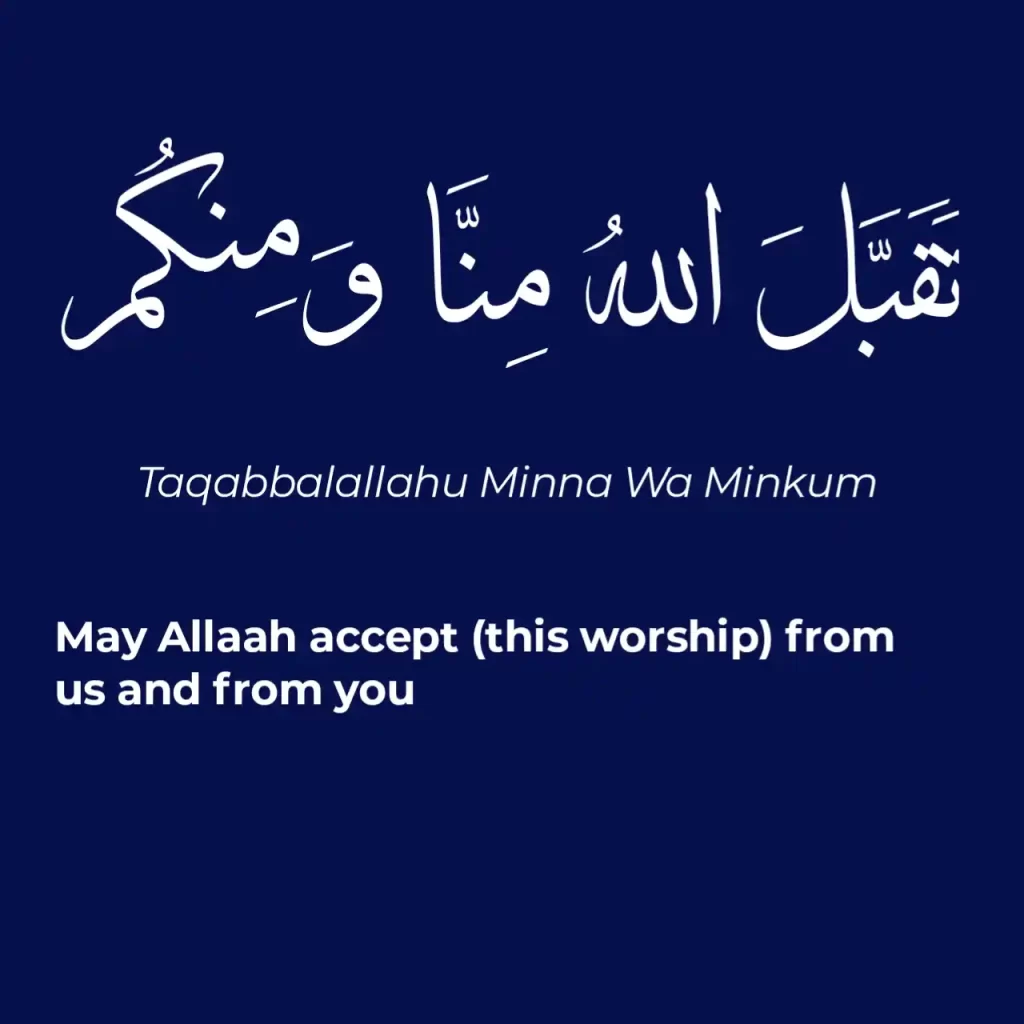
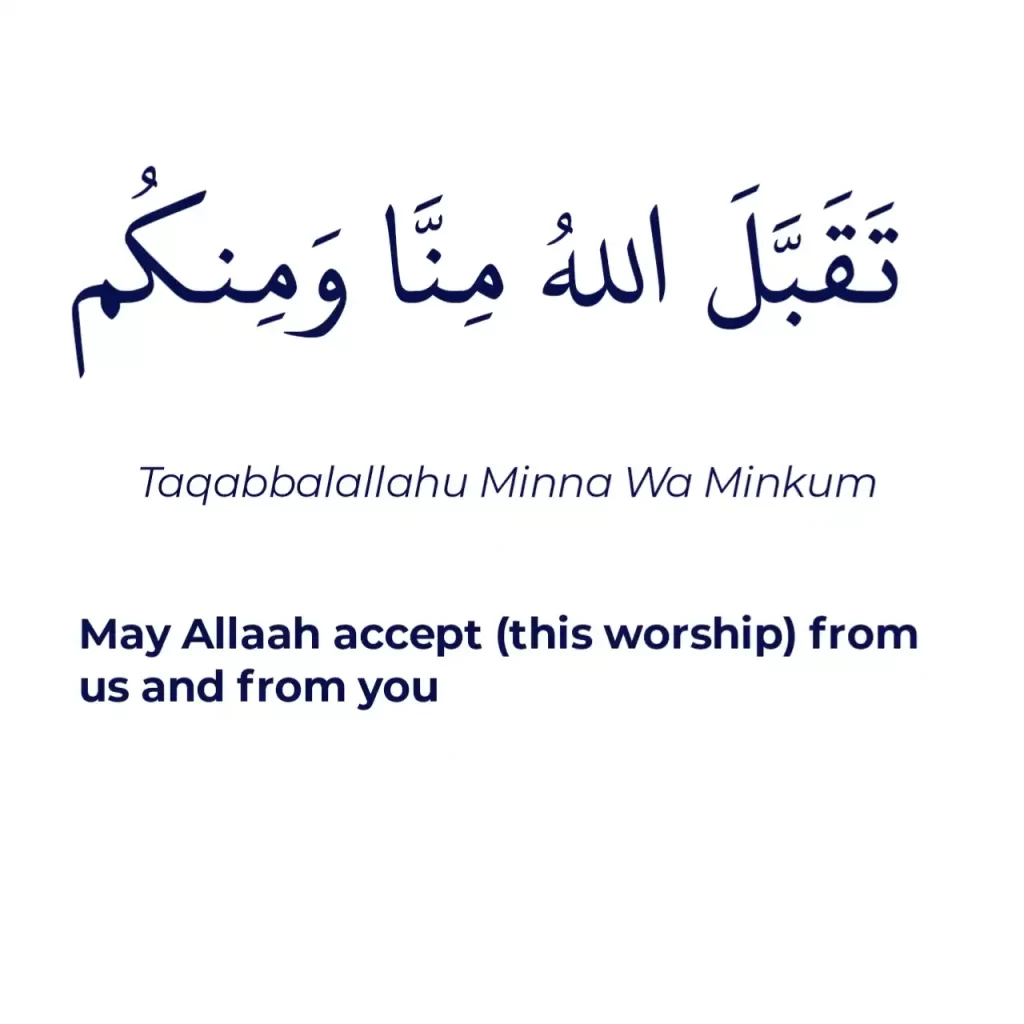
Let’s break down the beautiful dua “May Allah accept (this worship) from us and from you” into a listicle format, providing details for each point:
- Introduction: The Essence of the Dua
- This dua is a heartfelt supplication expressing the hope and desire that Allah accepts the worship or acts of devotion performed by the person making the dua and by others.
- Universal Appeal: “From Us and From You”
- The inclusivity of the dua is noteworthy. By saying “from us and from you,” it extends the prayer to encompass not just the person making the dua but also others. This fosters a sense of community and shared spirituality.
- Humility and Recognition of Allah’s Acceptance
- Implicit in the dua is a humble acknowledgment that the acceptance of worship ultimately lies in Allah’s hands. It reflects the understanding that despite our efforts, true acceptance is a mercy from Allah.
- Expressing Good Intentions: Sincerity in Worship
- By making this dua, individuals express their sincere intentions in their worship. They seek not only to perform the acts of devotion but also for these acts to be accepted by Allah, emphasizing the importance of sincerity in worship.
- Building Connections: Community and Brotherhood
- The phrase “from us and from you” builds a sense of unity and brotherhood among believers. It signifies that everyone is collectively striving for acceptance in their worship, fostering a community bond centered around shared faith and devotion.
- Encouragement for Others: Positive Wishes
- This dua serves as a positive and encouraging prayer for both the person making the supplication and those around them. It implies a hope for the best for everyone involved, promoting goodwill and positivity within the community.
- Reflecting on Worship: Continuous Improvement
- By seeking acceptance in worship, individuals implicitly acknowledge the continuous need for improvement in their spiritual endeavors. The dua becomes a reflective tool, prompting believers to strive for excellence in their acts of worship.
Etiquettes of Eid
Below are some etiquettes of Eid
- Offering congratulations/Salutation.
The etiquette of Eid also include good wishes by people, no matter what the wording, such as saying to one another Taqabbala Allah minna wa minkum (May Allah accept (good deeds) from us and from you” or “Eid mubaarak” and other permissible expressions of congratulations.
- Doing ghusl (bath) before going for Eid prayer:
It is mustahabb (recommended) to do ghusl before going for Eid prayers. Just like it is recommended for Jumu’ah, a Muslim is advised to observe it.
If it is Eid fitr, note that it is a day we must emphasis that fasting has ended, so, endeavour to eat something.
It is strongly recommended even if it just little, you need to take in food, snacks or fruits. The Prophet SAW used not to go out on the morning of Eid al-Fitr until he had eaten some dates.
This however does not apply to Eid-il-Adha, which does not permit eating before going to Eid until one comes back from the prayer.
- Adorning oneself on the occasion of Eid:
Every Muslim is advised to wear his or her best clothes. But women must not show off their beauty to commit sin.
- Do Takbeer on the day of Eid:
This is one of the greatest Sunnahs on the day of Eid.
- Lastly, going to the prayer by one route and returning by another important etiquette.
On the day of Eid, the Prophet (peace and blessings of Allah be upon him) used to vary his route. (al-Bukhaari)
It was said that the reason for that was so that the two routes would testify for him on the Day of Resurrection, for the earth will speak on the Day of Resurrection and say what was done on it, both good and bad.
Taqabbalallahu Eid Greetings Images
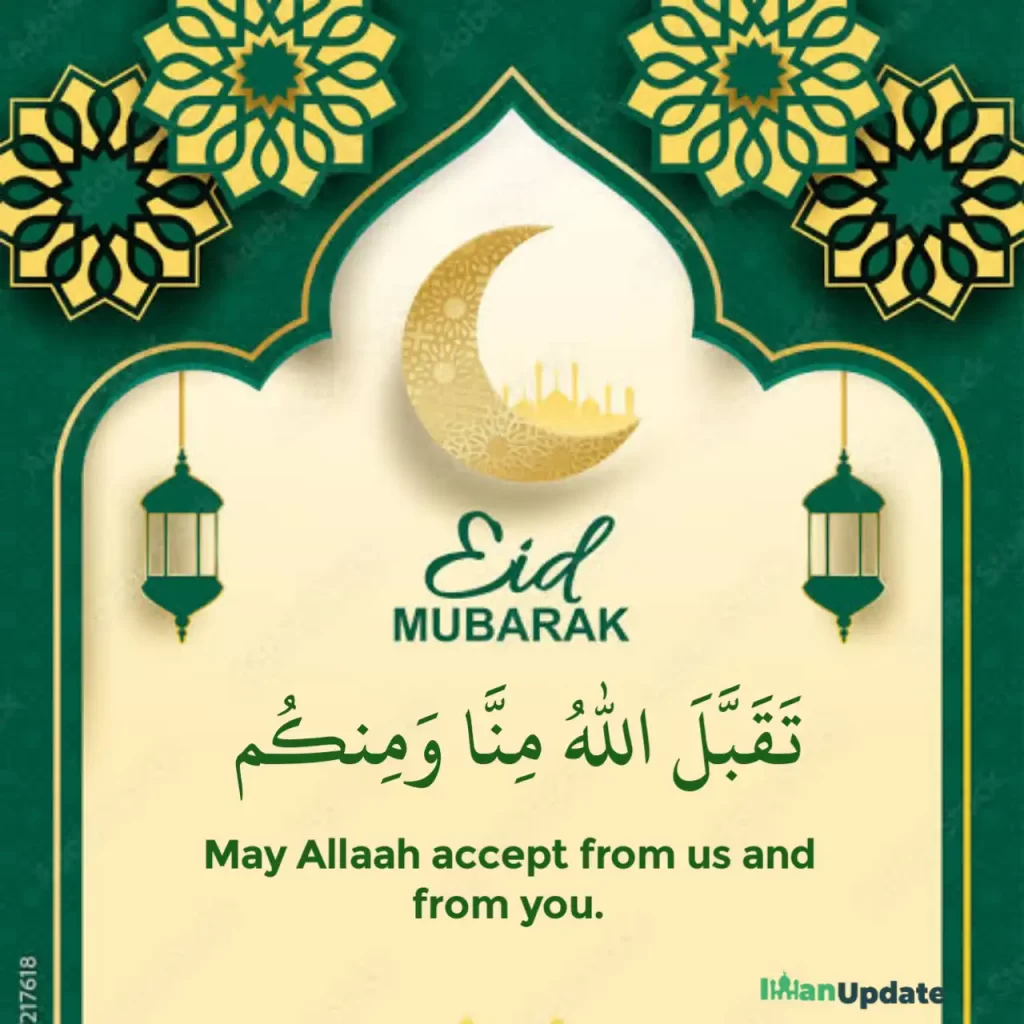
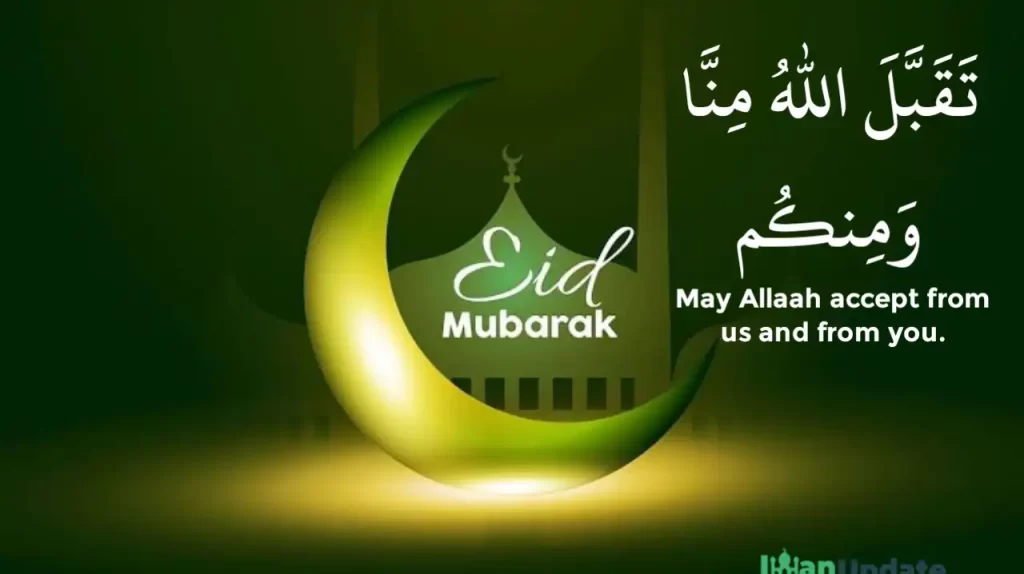
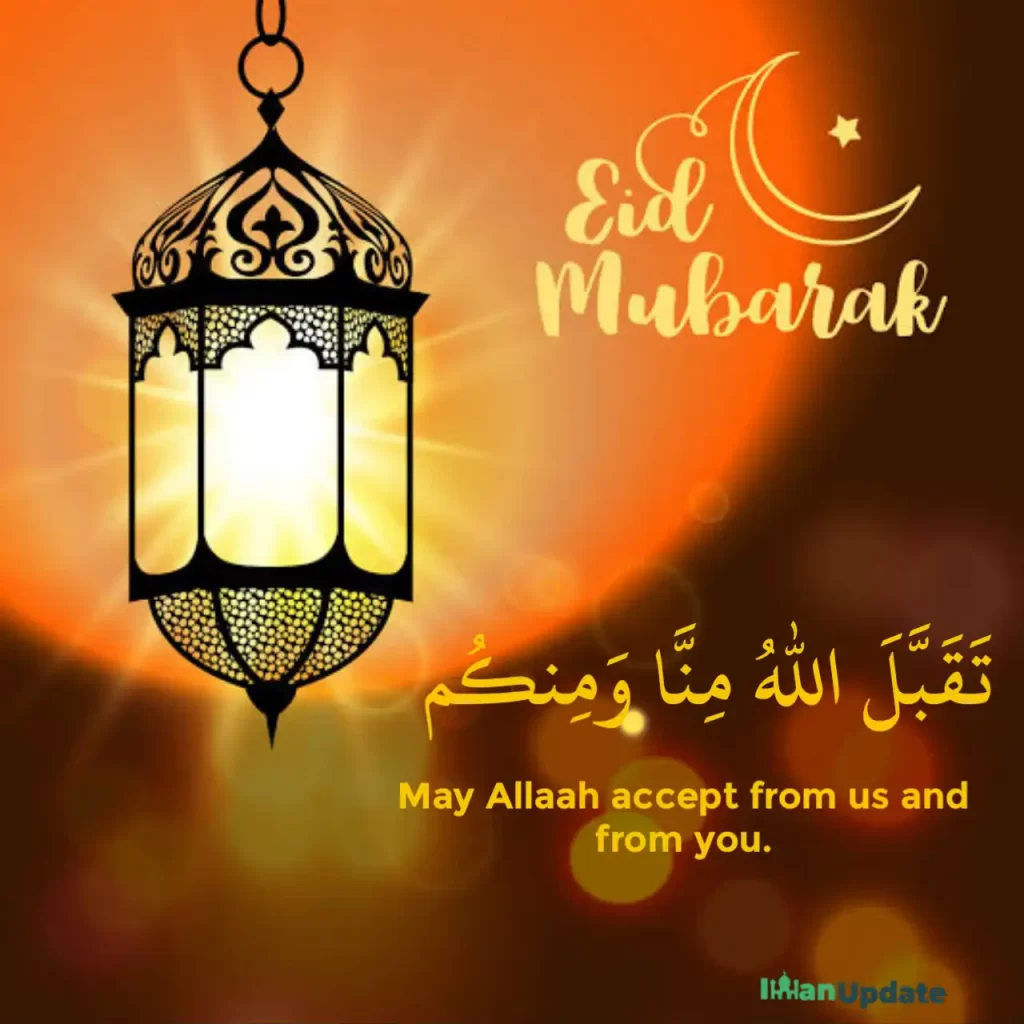
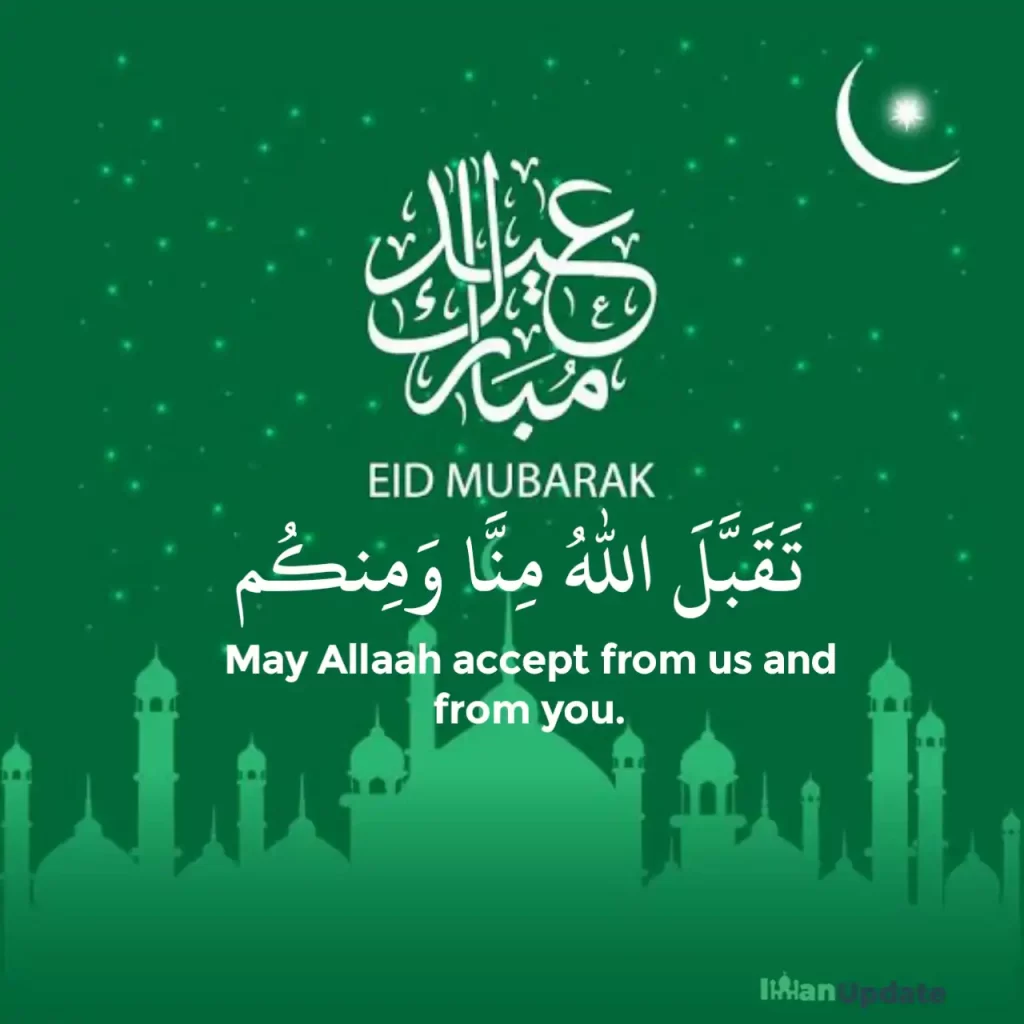
Advertisements

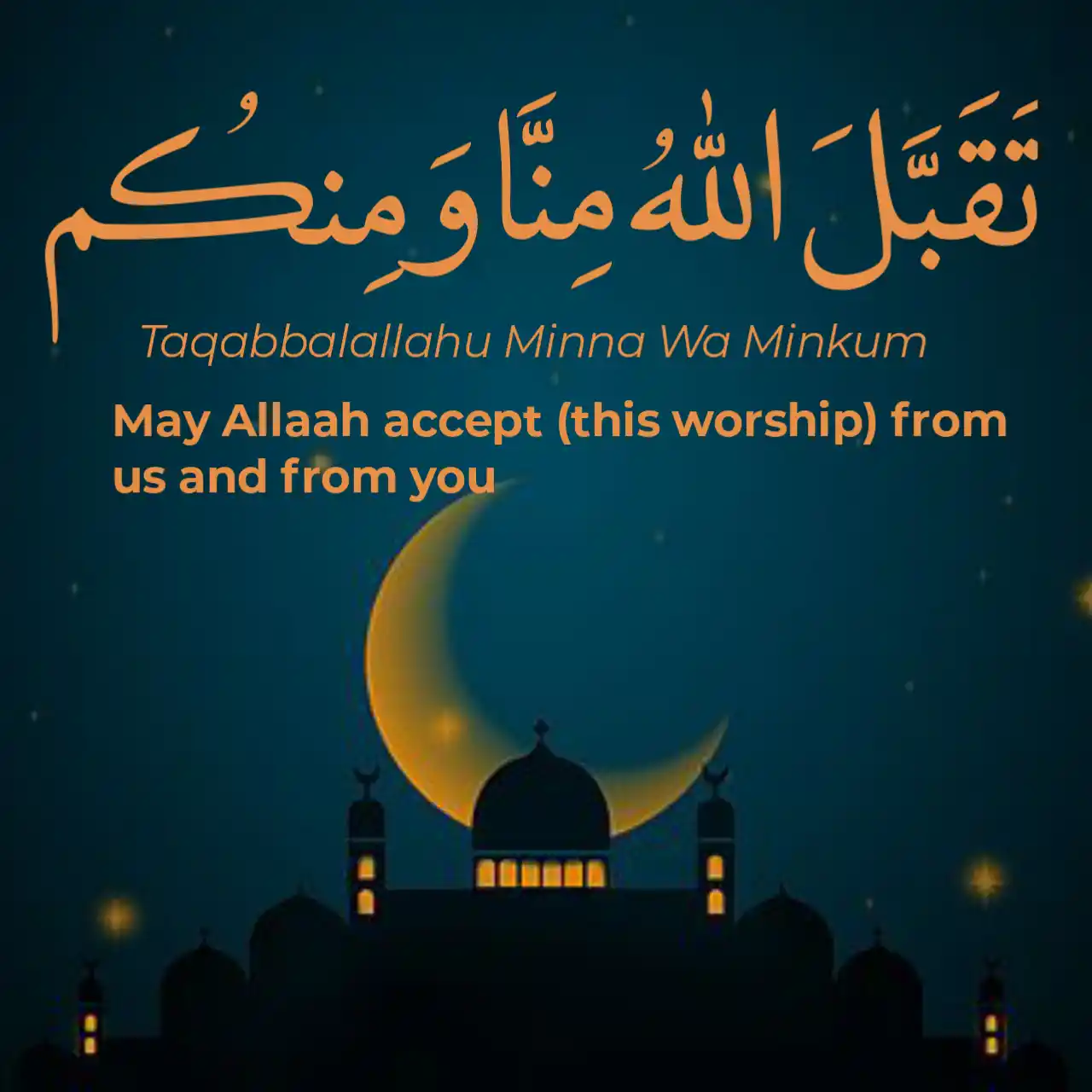
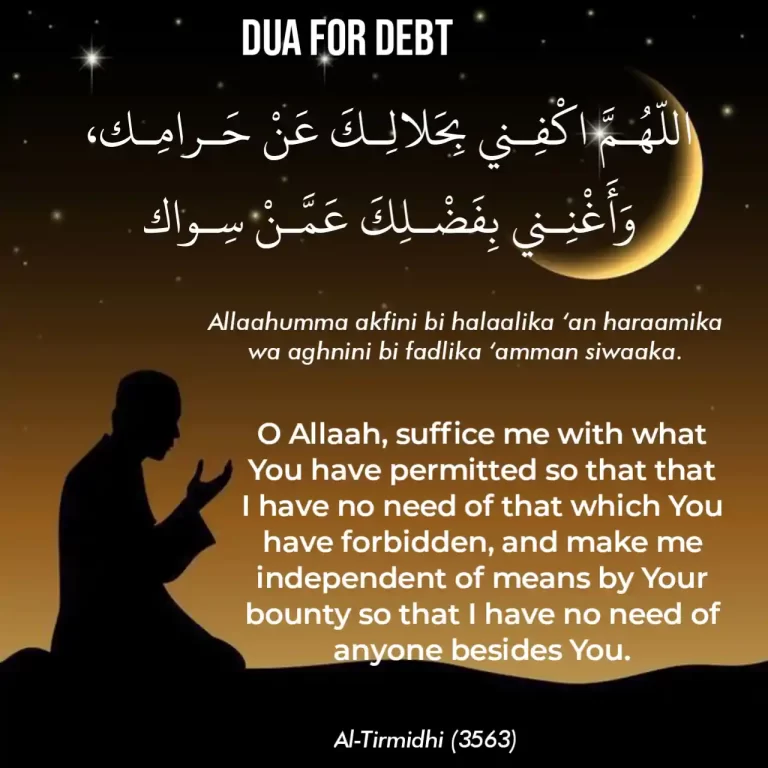

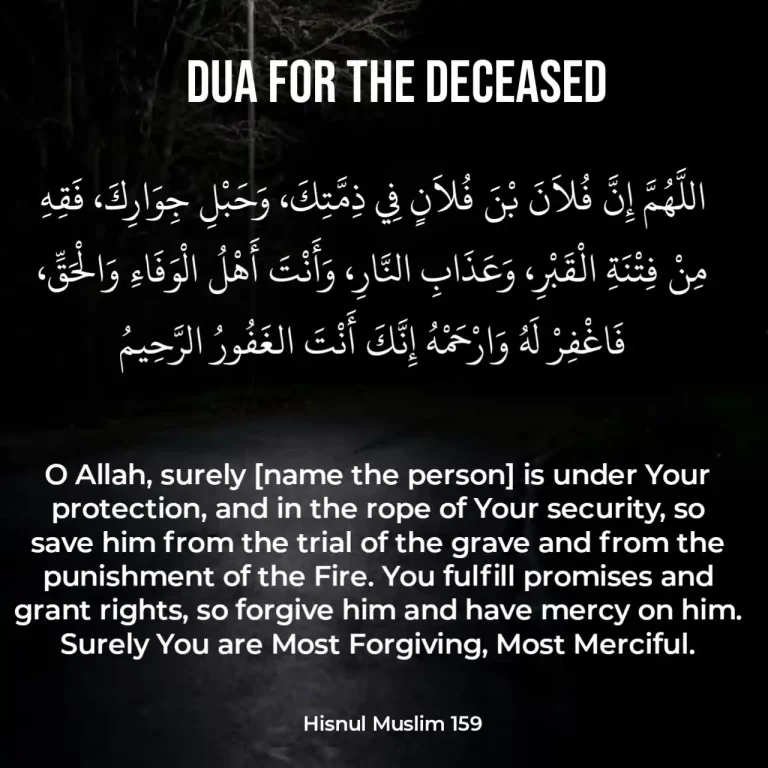
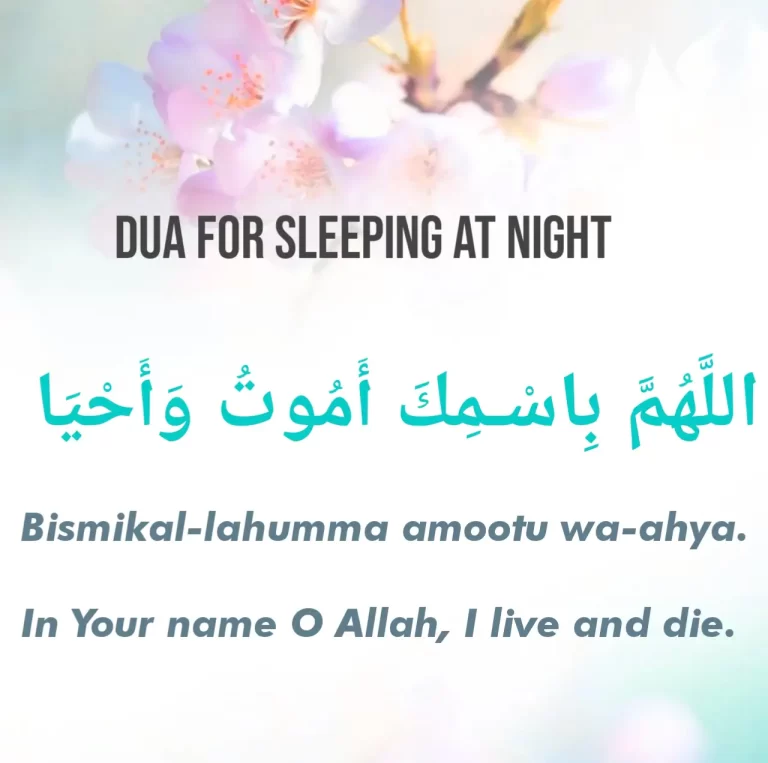

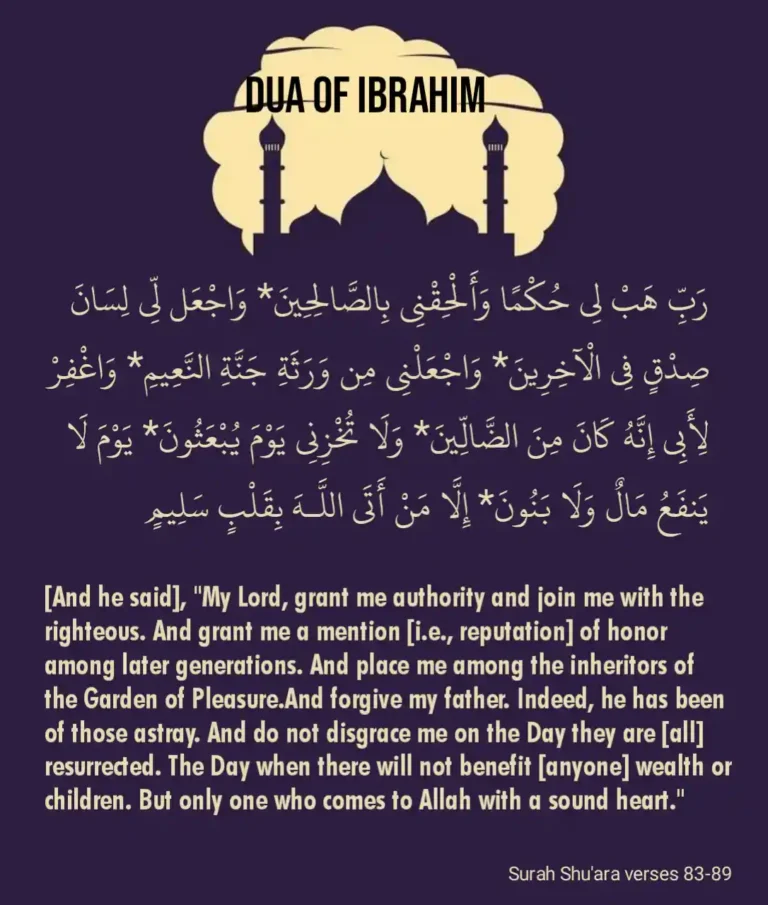
This is a beautiful and meaningful post. Thank you for writing it.